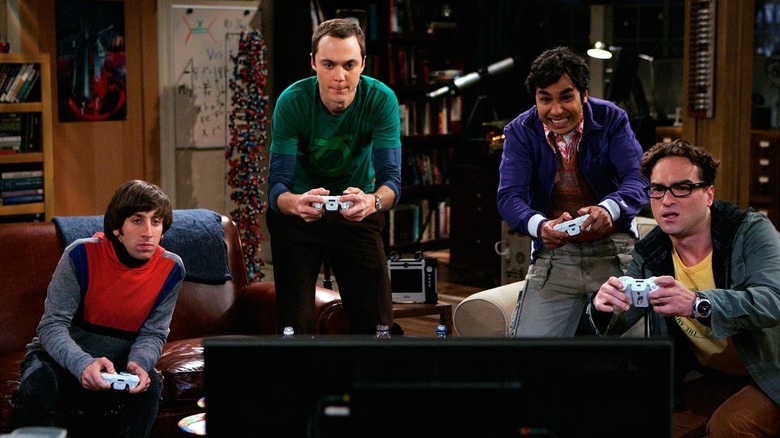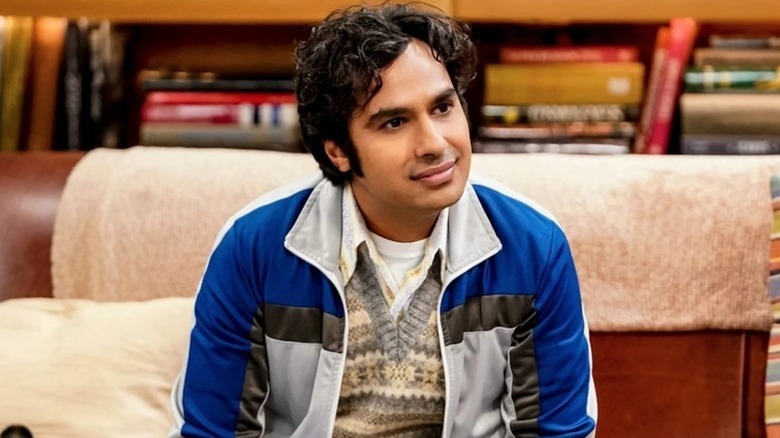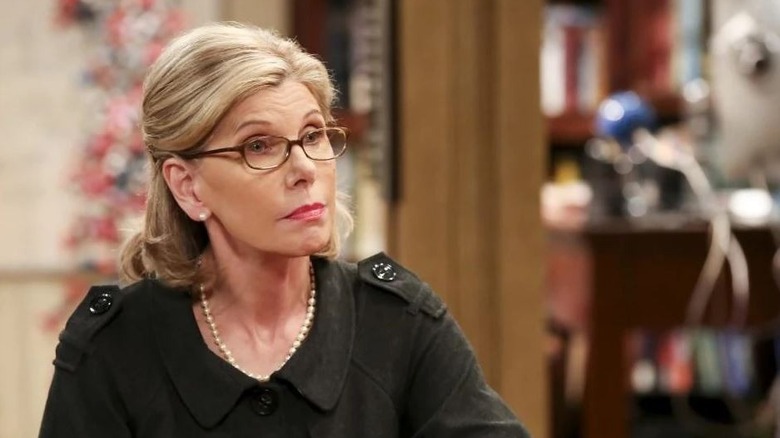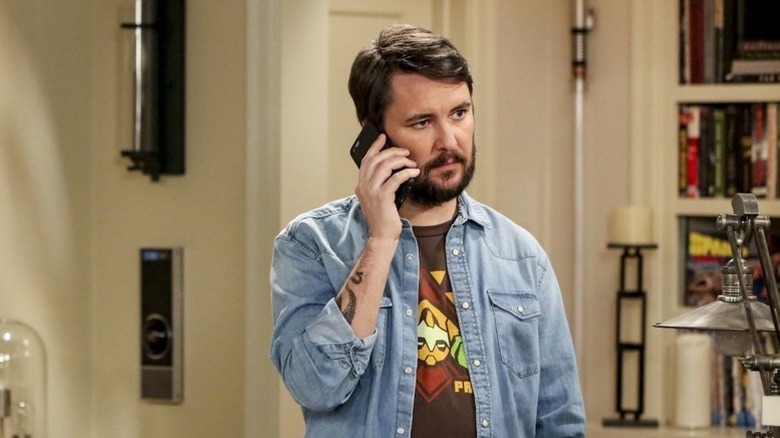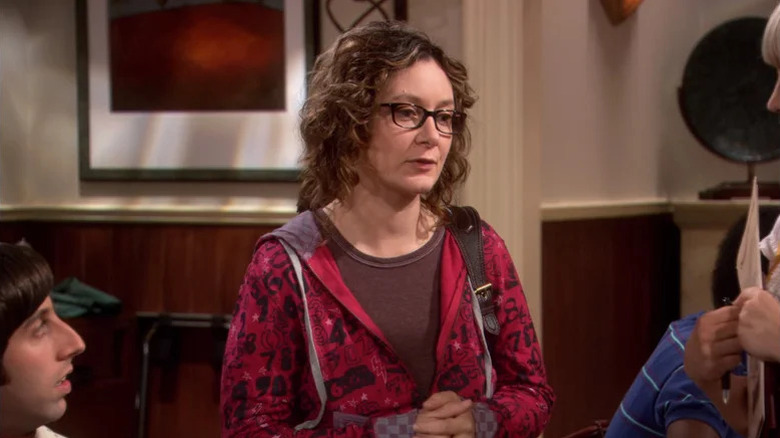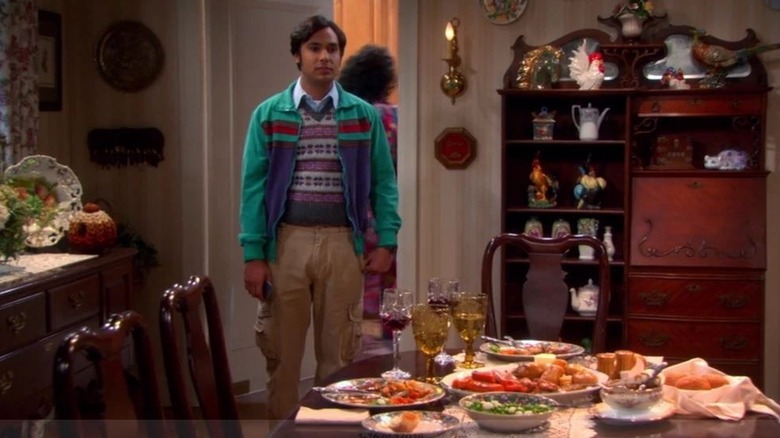5 The Big Bang Theory Characters Who Deserve Their Own Spin-Off Series
Even by sitcom standards, "The Big Bang Theory" has plenty of colorful characters. However, the show tends to keeps a tight focus on the original core group of Sheldon (Jim Parsons), Leonard (Johnny Galecki), Penny (Kaley Cuoco), Howard (Simon Helberg), and Raj (Kunal Nayyar), which means that several supporting characters don't get the attention they deserve. Some rise above the fray: Mayim Bialik's Amy and Melissa Rauch's Bernadette were both promoted to main character status in season 4 and remained as such until the end of the show. Several other characters have also enjoyed briefer stints as part of the main cast before either exiting the show completely or quietly falling back out of focus.
An abundance of these peripheral figures has left the show with an overwhelming surplus of fascinating characters who just don't get the sort of focus they could no doubt handle, either because they don't quite gel with the main characters or because they simply don't fit the narrative at hand. Fortunately, "The Big Bang Theory" franchise has recognized this and started to expand its universe with a series of spin-offs.
"Young Sheldon" and "Georgie & Mandy's First Marriage" both take place in the past, but the upcoming spin-off focusing on Kevin Sussman's Stuart Bloom, "Stuart Fails to Save the Universe," will finally turn the spotlight on the hapless artist-slash-comic book store owner. The show also marks the return of at least two other popular supporting characters from "The Big Bang Theory," Stuart's partner Denise (Lauren Lapkus) and Caltech geology professor Bert Kibbler (Brian Posehn). This is a welcome indication that there could be more on the horizon ... and if you ask me, these are the five "The Big Bang Theory" characters who should be next in line for a spin-off of their own.
Raj Koothrappali
There's only one member of the main cast who truly deserves a spin-off at this point, and that's Kunal Nayyar's Dr. Rajesh Koothrappali. This is not a dunk on any other character, mind you — Raj just happens to be the only one whose life situation and "The Big Bang Theory" arc warrants further exploration. He has extremely rich parents with whom he has a strained relationship, and a level-headed lawyer sister, Priya (Aarti Mann). He has a cute dog. He even has an interesting astrophysics career that has earned him international attention, a feud with Neil DeGrasse Tyson, and even an extraterrestrial life-themed scandal — in other words, an ideal job for those workplace comedy scenes any sitcom worth its salt relishes. What's more, he has potential.
In Commedia dell'Arte terms, Raj is a Pierrot– lonely, lovelorn, the proverbial runt of the litter. He's the only main character on "The Big Bang Theory" without a long-running romantic arc, and often ends up falling through the cracks as the show progresses and its focus shifts to various characters' nest-making crises. What's more, much of his story so far is about adaptation: Over the course of the show, he goes from a foreign trust fund kid who's learning American culture and struggling with his insecurities to a (comparatively) self-assured person with a great career, and the show even lampshades his stepping out of his best friend Howard's shadow with Raj's late-game style transformation.
All of this makes Raj the perfect candidate for a spin-off. His entire "The Big Bang Theory" arc is effectively one long origin story, and the man it shapes him into could very easily lead a sitcom of his own — especially since "The Big Bang Theory" finale leaves his future wide open.
Beverly Hofstadter
Leonard's incredibly successful mother, Dr. Beverly Hofstadter (Christine Baranski), is arguably the cruelest and most arrogant character on "The Big Bang Theory," which is saying something on a show that also features Sheldon Cooper. A cold, domineering psychiatrist and neuroscientist, her analytic personality and somewhat ironic obliviousness to other people's feelings make her a reliable delivery channel for some of the show's darkest laughs. Granted, she gets better as the show progresses. Still, tonally speaking, she's an agent of discord who seems like she'd be far more at home trading barbs with the Crane brothers on "Frasier" than she is on "The Big Bang Theory" — which, of course, is the point. As it happens, it's also a key part of my pitch for a Beverly spin-off.
Imagine Baranski, an award-winning veteran of shows like "The Good Wife" and "The Gilded Age," leading a "Frasier"-style show custom-built around her character as she cuts a path of analysis and insults through the celebrity scientist field. Ideally, I'd see this as a slightly more dramatic show than the original — after all, "Young Sheldon" already proved that tonal changes are entirely possible in the "Big Bang" universe. However, Baranski has ample sitcom experience (See: Her 1995 Primetime Emmy for "Cybill"), so there's no reason why the general tone of the series couldn't be more mellow than its central character. This, after all, might be the easier way to facilitate cameos from Leonard, Penny, Sheldon, and the other "The Big Bang Theory" characters she's interacted with.
Wil Wheaton
Wil Wheaton isn't the only real-life celebrity to appear on "The Big Bang Theory," but he's by far the most prominent. Wheaton turns up in 17 episodes, notably playing a villainous version of himself. After meeting Sheldon in a Mystic Warlords of Ka'a tournament in season 3, the two almost immediately develop an antagonistic relationship, and even after they make peace in season 5, the friendlier Wheaton remains a force of chaos whose appearance tends to signal absurd events and terrible misunderstandings.
Basing a show on a character who's a fictionalized weirdo version of the actor might seem like a stretch, but it has been done before with some success. In 2008, action star Jean-Claude Van Damme played an out-of-luck version of himself in the satirical "JCVD" to critical acclaim, and later revisited a spy variation of the theme on the Ridley Scott-produced comedy-drama series "Jean-Claude Van Johnson." From 2011 to 2017, Matt LeBlanc's hidden gem of a best sitcom, "Episodes," saw the "Friends" star turn in a Golden Globe-winning performance, meshing aspects of his own actor persona with a far more realistic take on the Joey Tribbiani lothario archetype. Most recently, 2022's "The Unbearable Weight of Massive Talent" is an exploration of a fictionalized Nicolas Cage's professional and personal struggles against an action-comedy backdrop.
Though he's still very much working, Wheaton continues to be best known for his role as Wesley Crusher on "Star Trek: The Next Generation," which puts him in a similarly typecast box as LeBlanc was before "Episodes." His "The Big Bang Theory" incarnation might very well be content to just turn up in the Stuart spin-off every once in a while, but "The Big Bang Theory" Wheaton is more than captivating enough to star on a show of his own.
Leslie Winkle
Sara Gilbert's Leslie Winkle left "The Big Bang Theory" for a legendarily unfortunate reason: She was an experiment that didn't work. Introduced as the show's female answer to Leonard, Leslie was one of the characters "The Big Bang Theory" tried out as potential romantic interests, but she soon became a piece that didn't really fit in "The Big Bang Theory" puzzle, and waltzed off to do her own off-screen thing.
To me, Leslie is arguably the greatest example of a character that the show absolutely wasted. While I fully understand why the abrasive and controlling experimental physicist didn't really gel in with the main cast — they already had a surplus of both character traits, after all — she's a fun character in her own right, and would no doubt do very well in a show that puts her on the pedestal instead of throwing her at members of the main cast to see what happens.
Thanks to her brief reemergence in season 9, we also know that time and personal growth have sanded some of Leslie's rougher edges off, which is requisite for a character's transition from a colorful bit part player to a main character. It could also provide an angle for the potential spin-off: What better premise than to depict what she was up to during the years she was away from the screen? Making a show that focuses on Leslie's as-yet unseen exploits from "The Big Bang Theory" season 3 onward would allow the viewers to follow her story while the events of the parent show play out on the side. Such a premise would not only give Gilbert's character a deserved opportunity to shine, but it'd be fertile ground for character cameos and references to concurrently occurring "The Big Bang Theory" events.
Debbie Wolowitz
An admittedly bold suggestion here, given the fact that Mrs. Wolowitz's death on "The Big Bang Theory" was a major event. The character was retired after her voice actress, Carol Ann Susi, died in 2014, so it might seem controversial to bring her back, let alone give her a spin-off show. Then again, Debbie Wolowitz does deserve redemption.
On "The Big Bang Theory," Mrs. Wolowitz is an unseen character whose implied physical dimensions in her advanced age are a common subject of body-shaming jokes. She's also generally portrayed as grating and domineering. Yet, she's the closest thing to a reasonable parental figure the central group has. A "Young Sheldon"-style prequel with the focus on her would not only offer fun glimpses into Howard's childhood (which may or may not be suspiciously similar to his adulthood), but also give Debbie Wolowitz some much-deserved focus — and hopefully exorcise some of the unreasonable weight bias associated with the character.
As to who could (let alone should) take over the role, there are two distinct candidates. If we're going for a show set during Howard's teenage years, the obvious choice would be Pamela Adlon, who already worked on Mrs. Wolowitz's voice on "Young Sheldon." If we're taking things a touch further into Howard's childhood, on the other hand, I'd just go ahead and cast Melissa Rauch. Though she already plays Bernadette on "The Big Bang Theory," the character's resemblance to a younger Mrs. Wolowitz is mentioned a number of times. What's more, highlighting these comparisons by having the actual same actress play both roles would be a fantastic reference to Howard's somewhat unhealthy relationship with his mother. It wouldn't exactly hurt that Rauch can reportedly do an uncanny impersonation of Mrs. Wolowitz's voice, either.
